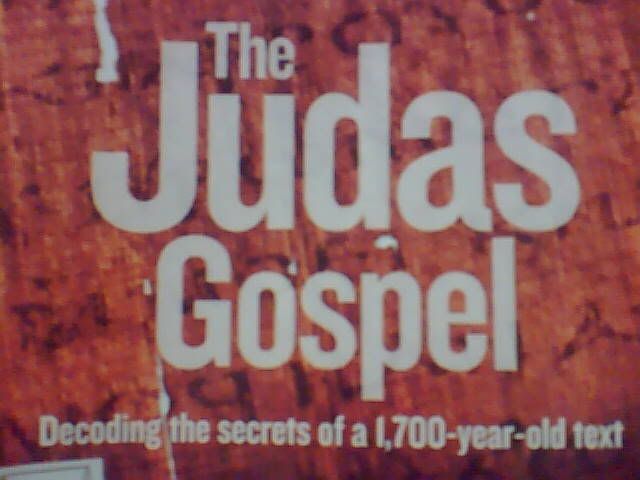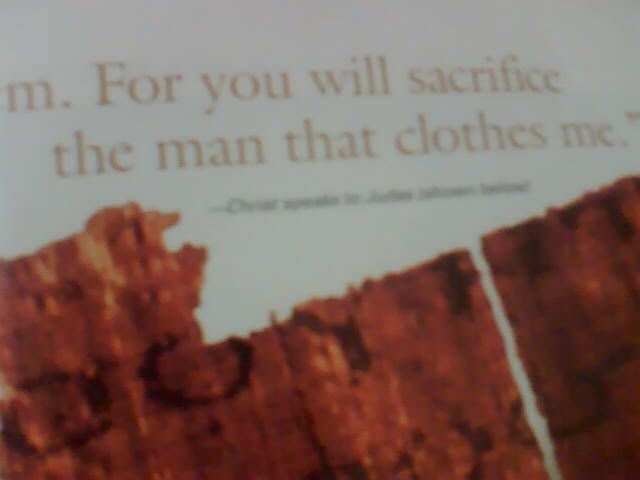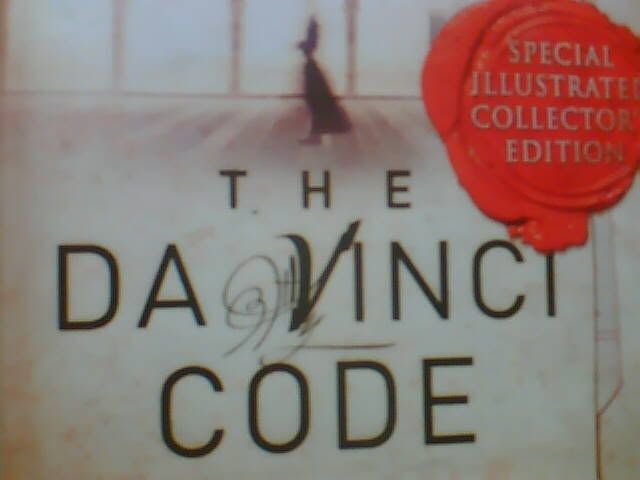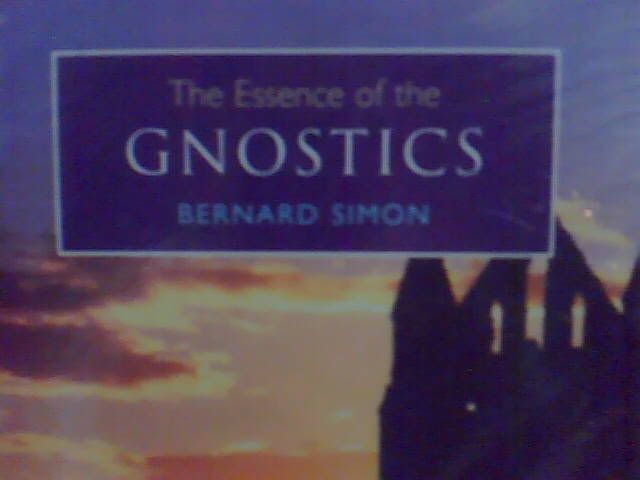 I think I've always been fascinated with the dark secrets of Catholicism. I wanted to find an angle for my blog entry about the Gospel of Judas, that fine piece of documentary-cum-expose shown by National Geographic before the Holy Week. Initially, I asked myself, why do I feel so compelled to write something about it? Then some impish alterego voice in my head chided: "Wrong question. The question is: why are you becoming obsessed with things like this lately?" And as I tried to recall my fascinations as far back as I could, I realized (and defended against that impish voice) that it's not an obsession-come-lately. It has always been there.
I think I've always been fascinated with the dark secrets of Catholicism. I wanted to find an angle for my blog entry about the Gospel of Judas, that fine piece of documentary-cum-expose shown by National Geographic before the Holy Week. Initially, I asked myself, why do I feel so compelled to write something about it? Then some impish alterego voice in my head chided: "Wrong question. The question is: why are you becoming obsessed with things like this lately?" And as I tried to recall my fascinations as far back as I could, I realized (and defended against that impish voice) that it's not an obsession-come-lately. It has always been there.
Back in grade school, I remember going to the Guadalupe minor seminary for a recollection activity. A confidante-classmate and I broke away from the group during our free time and prowled the seminary, went into the obscure and darker areas, half-hoping to discover something or be freaked out by -- oh, I dunno -- a ghost(?)
Then there was television. Around the same time, I remember repeatedly watching this horror/thriller movie shown in the afternoon. (It could be on RPN-9.) The movie was called "The Sentinel," it's about a secret order who manage the succession of hermits, who become "guards" in an apartment building that was actually a portal from which all evil could invade the human world. I might have seen it more recently, and I'm quite sure I watched it like I've never seen it before.
 In high school, that period of heart-wrenching identity crisis, I got involved with the "born again" movement. Much less because of my loss of faith in the Catholic church but more because of finding "healing" from my identity crisis via a more personal relationship with the Christ. Strange logic, strange times, and a very strange me actually. I was very ravenous about reading one book, the title which escapes me now. It's about the Catholic church being the prophesied "whore of Babylon." There was a chapter there that reduced many of the Roman Catholic church's rituals and artifacts into numbers, and all of those cited amounted to 666.
In high school, that period of heart-wrenching identity crisis, I got involved with the "born again" movement. Much less because of my loss of faith in the Catholic church but more because of finding "healing" from my identity crisis via a more personal relationship with the Christ. Strange logic, strange times, and a very strange me actually. I was very ravenous about reading one book, the title which escapes me now. It's about the Catholic church being the prophesied "whore of Babylon." There was a chapter there that reduced many of the Roman Catholic church's rituals and artifacts into numbers, and all of those cited amounted to 666.
In college, I seemed to have lost passion for anything spiritual. That sounded empty, I dunno, I could have been empty. And I could have lost trust in myself in being able to reconcile spirituality with corporality. There simply were no clear answers. I rejected spirituality. Later in college, and into my early days of working "rackets," I was fortunately too busy and too restless to take some time off and think into these things.
The late nineties was worse, in retrospect. I lost my advertising job thanks to the Asian financial crisis. Mom started a small business and I worked for her: there were days that I earned less than a peso. Because I had nothing much else to do, I went back to attending Sunday mass. It felt good to actually do something, if not for just acting or going through the motions of the mass rituals. Eventually, but by no means clearly distinguishable by time, place or event, I again sort of got fascinated with Catholicism, including all its pa-grandiosity. Maybe because of friend gregg who had lived a monastic life once, no, make that twice. Or maybe because I'm growing old. *Insert pregnant silence here* No definite answers there.
 Then the Da Vinci Code broke the silence of the Catholicized norm. Or that's how some people think... it was because of that book that people warmed to questioning again. Someone told that to me actually, I don't remember who, it might be eon. My growing interest for digging the roots of Catholicism was spurred by the popularity of the book and the intrigues that it created. Ano ako, faddist?
Then the Da Vinci Code broke the silence of the Catholicized norm. Or that's how some people think... it was because of that book that people warmed to questioning again. Someone told that to me actually, I don't remember who, it might be eon. My growing interest for digging the roots of Catholicism was spurred by the popularity of the book and the intrigues that it created. Ano ako, faddist?
I'm quite sure that I began to reconsider my displaced spirituality after I attended a workshop organized by Health Action Information Network (HAIN); "Defending the Faith," it was called, and it was for workers in reproductive health (and by extension, HIV/AIDS, where I am at). It felt like falling off a chair while dozing when Mike Tan began talking about his own efforts at reacquainting himself with Christianity. I always get mesmerized with Mike's talks, especially those where he makes connections between facts and figures and socio-cultural values. But up until this workshop, I haven't heard him speak of matters of faith, particularly one that enabled him to disclose what I'd think is a very personal matter. (It was way too subjective-sounding for me to associate it with Mike.)
Having been demonized by certain groups and leaders, our passion for our work in RH and HIV/AIDS seemed to have alienated us from the Church. (Have you heard of DEATH as an acronym? Divorce, euthanasia, abortion, total population control programs, homosexuality, things that would allegedly threaten to end humanity.) I admit, I had the notion of our work and us having irreconcilable differences with the teachings of the church. But it should have not necessarily been so, it now seems. I learned about the Church having shifted several times in history in its position about sexuality and reproduction issues. I had fun doing that Mary of Magdala exercise, where we deconstructed all the previous (and heretofore unquestioned) characterizations of Mary Magdalene, the prostitute. I have never appreciated "The Church is the People" argument as much before until this workshop. At the end of all our discussions, we left with one personal resolve: discernment.
 Which I think what has led me to my Internet search frenzy. It started with unearthing the now-Vatican-ignored beauty of Vatican II, searching for the gospel of Mary (much discussed about in the wake of the Da Vinci Code pop culture siege), landing at the gnostics resource site, discovering the Nag Hammadi library, getting the perspective of Jewish scholarship on the "New Testament," the forgeries in the gospels, the "Q," and so on and so forth. Gospel of Judas just came at such an opportune time in learning the skills of "discernment."
Which I think what has led me to my Internet search frenzy. It started with unearthing the now-Vatican-ignored beauty of Vatican II, searching for the gospel of Mary (much discussed about in the wake of the Da Vinci Code pop culture siege), landing at the gnostics resource site, discovering the Nag Hammadi library, getting the perspective of Jewish scholarship on the "New Testament," the forgeries in the gospels, the "Q," and so on and so forth. Gospel of Judas just came at such an opportune time in learning the skills of "discernment."
But what has the Gospel of Judas, the documentary, brought into all this excitement? For me, there were several. First, the gatekeeper known as Irinaeus or his "four winds, four corners of the world, four gospels" principle -- I was flabbergasted that we (i.e., the people) actually bought it. Second, the dynamism of early Christian movements -- how I wished Christianity could be once more as vibrant but this time with much more humane and civil regard for each other. Finally, the Christ characterization in this gospel -- Jesus was a different man, disarming and revolutionary in his time, I'd like to believe; in this text, this characterization was very clear.
I grew up discouraged from questioning. Millions of others over many, many years may have been as well. With the fortification of one -- uh -- brand of Catholicism, the light of the dynamic Christian faith discourse has been snuffed out. How disempowered people have become in face of such a monolith, no? Surely, there are so much more questioning to do (for example, "What about infallibility and all that?") As for myself, however, one thing can never be questioned anymore: I'm now aware/discerning and I shall never be unaware/unquestioning ever again.
1 comment:
Hey, glennie! Remember me telling you I so wanted to comment on this blog but rather not? Now I have to. I just want to let this one out of my system.
Two months into my job of editing latin manuscripts, I always remember this blog everytime I face the screen to see how much mess the Sri Lankans did in encoding the manuscripts. And everytime, I get to be thrown into a different world. A real one that definitely happened some time in the past. Looking at the manuscripts and seeing them in the angle of context, content, and history, I remember St. Irenaeus of Lyon. Yes, that guy you guys so hated for trashing the Gospel of Judas from the canonical books of the gospels. But, mind you, with what I do right now, I have so much sympathy for Irenaeus. I could very well identify with his predicaments as to which book should give credence to the matter in point, in his case - Jesus and his divinity. I now understand his responsibility of upholding the christology of the Church while at the same time recognizing which and whose writing is/are congruent with such theology. Judas's account just couldn't stand against all four - john, Luke, Mark, Matthew - enough for it to be trashed away. Yep, I could empathize with that.
Part of my job is to see whether the encoders of the latin manuscripts, say a catholic document on the Reformists particularly John Calvin, correctly tagged (you know xml, right) bible citations in the document as bible citations or mere patristics (citation from the Church Fathers). Turned out, as the encoders are Muslim or Buddhists Sri Lankans, everything is tagged as bible citations. Well, what do they know about the difference between the writings of St. John Chrysostom, Augustine of Hippo, and Matthew, especially that they are talking about the same Christ? If Irenaeus was Buddhist, Matthew, Mark, John, Luke, and Judas... they are all the same. And if he's into xml, he can simply tag them all as bible citations.
Sometimes, the manuscripts I work on would site what seem to be a Bible site but does not quote directly from the bible. I could easily say it's from the Bible if it says Ioh.1.4 (John 1:4) or 1.Reg.4 (1 Kings Chapter 4). But if it says Epis.1.5 or Ep.2.4. I can't readily say the writer is citing from the Epistle of Paul or from the Epistle to the Ephesians. You see, the Church Fathers manuscripts are also cited by early theologians as Epistles (because that's what they are, letters) and are abbreviated as Epis. or Ep. (in this case, easily confused with Ephesians of the New Testament) followed by verse numbers. Without any quotation to identify the books, we delve into the whole body of the work to see what the content is all about and compare it to what the Epistle of Paul or Epistle to the Ephesians are saying. If they jibe, then it must be a bible quote. If not, it was one of those patrological writing from Ambrose to Tertullian.
Irenaeus has the same dilemma. He was confronted by six, seven, maybe even twenty gospel versions. How to deal with them? Get those that agree with each other, in this case Luke, Mark, Matthew, and John. Treat others as "the others" and that's Judas and the rest in the trash bin. Sounds simplistic but that's how we systemically weed out the preposterous from the authentic (to determine how preposterous and authentic is another story). It's the same system used in the courts. One testimony against several witnesses, well, you know the verdict.
I can only say here what I feel in regards to the concern of Irenaeus, Judas's alleged gospel, and what I do at work. We all have the same dilemma. Someday, if ever I end up like Judas hanging on a tree, or Iraneaus being chastised by future scholars, you can say "Gregg was just a good friend who simply did what he can with those miskeyed manuscripts. Blame it to the Sri Lankans."
Post a Comment